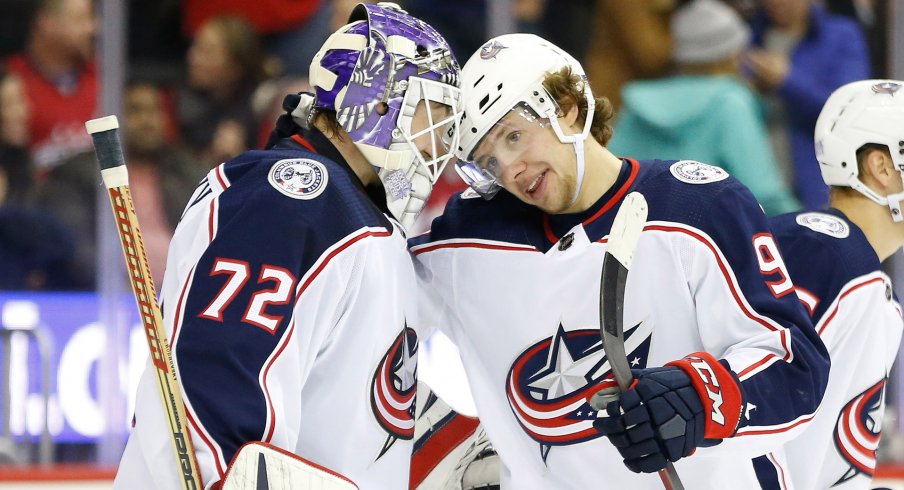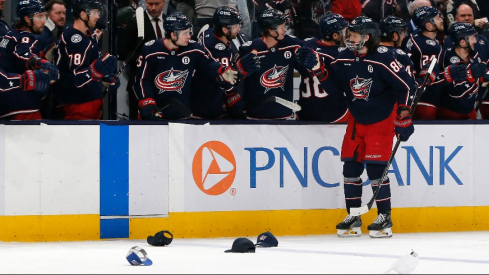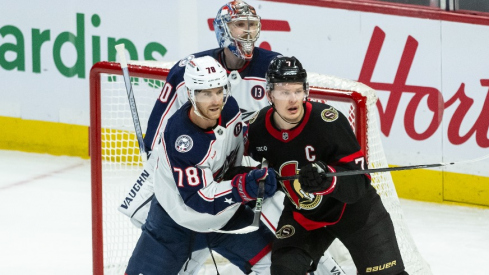The NHL's "negotiating period" for unrestricted free agents opens on June 23, which means that Sergei Bobrovsky and Artemi Panarin aren't permitted to talk with other teams until then without permission from the Blue Jackets.
A recent report from The Athletic's Pierre Lebrun indicates that, as of this week, the Blue Jackets hadn't permitted their agents to talk with other teams.
This puts Columbus in an advantageous position because they're able to continue a dialogue with Bobrovsky and Panarin about potentially staying, while controlling outside information from other interested parties and forcing an agreement with another team before they would be able to speak with the players; even if the player did not sign, it may result in future considerations or a late round draft pick in a future year.
On June 23, the Blue Jackets lose the power to control the narrative, so they have no reason to relinquish it sooner than they must.
What happens if the Blue Jackets trade Bobrovsky and Panarin before Free Agency Opens?
Before free agency opens on July 1, the Blue Jackets and potential trade partners have two options when looking at a trade for Bobrovsky and Panarin.
Option one: trade for Bobrovsky's and Panarin's rights. While not a concrete move to keep them, if done before July 1, the team would have extra time to talk with them about a contract. Additionally, they would be the only team able to offer them eight-year contracts. But if they don't sign either player, then they will have lost something for nothing.
Option two: The teams agree to a sign-and-trade. A concrete move to make Bobrovsky and/or Panarin a part of their team after agreeing with the Blue Jackets and the players on contracts and compensation.
What are sign-and-trades, and will one actually happen?
A sign-and-trade is a deal between a player, his current team and his future team that would allow the player to receive an eight-year deal through his current team that is then traded to his future team for compensation, whether that is future considerations, draft picks or a player. If there was no sign-and-trade, then the team and the player would only be able to agree to a seven-year deal in free agency, so essentially, the player's future team is compensating his current team for an extra year on the player's contract.
It's important to note: there has not been a single sign-and-trade in the NHL. So, the likelihood of one happening with Bobrovsky or Panarin is not good.
Do they want 8-year deals?
At 30, Bobrovsky is about to sign his last big NHL contract, and being able to get an extra year out of his deal should be important because it pushes him from 37 to 38 in what could be his last year in the NHL. Additionally, if he receives a new contract at 37 after his seven-year deal is up, he would see a decrease in his salary on the new deal.
Would a team be willing to sign Bobrovsky to an eight-year deal, though? Maybe. Bobrovsky holds a lot of cards in his hand being the No. 1 free agent goaltender available, and the only current NHL goalie to win the Vezina Trophy twice. Despite periodic struggles during the 2018-19 season, Bobrovsky turned it up at the end of the year and wasn't the reason the Blue Jackets didn't make it past the second round. Bobrovsky's stock will always be unfairly tainted until he wins a Stanley Cup, but he is one of if not the best goalies in the NHL and certainly the best goaltender heading into free agency. This will give him a lot of leverage when it comes to his next contract.
Panarin is only 27, which means an eight-year deal would make him 35 when looking for a new deal in the NHL. This would likely limit his offers after this contract is up, meaning he may be more than ok with a seven-year deal. At 34, he would be able to sign another longer-term contract and potentially not have to take a discount.
Any NHL team would love to lock up Panarin for eight years, essentially securing his most productive NHL seasons, and at 35, they could allow him to leave without seeing too much, if any, dip in production. Additionally, re-signing him at 35 would likely be cheaper and the term shorter, than re-signing him at 34.
End of the Day...
Bobrovsky has leverage to demand and would likely prefer an eight-year deal, but unless he is traded before free agency opens he will have to settle for a seven-year deal. While in Panarin's case, may not sign an eight-year deal because by being three years younger, it could negatively impact his next NHL contract. Additionally, although Blue Jackets fans would like to see a return on Bobrovsky and Panarin, don't hold your breath because it's unlikely that there will be a sign-and-trade for either player.


